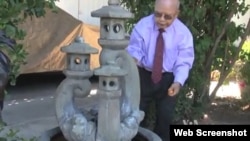Asians are the fastest-growing racial group in the United States, and that is resulting in a surge in the Asian-American electorate. The impact of the Asian vote can be especially prominent in California, the state with the largest Asian-American population in the country.
In a recent report, the group Asian Americans Advancing Justice Los Angeles found that the state has seen an increased number of registered voters over a four-year period. There currently are 1.8 million Asian Americans registered to vote in California, an increase of 150,000 voters.
Dan Ichinose, director of the group's Demographic Research Project, said most of the growth happening in Asian-American communities is driven by immigration.
Immigration
"The levels of immigration from Asian countries now, of course, outpace the number of immigrants coming from Latin America," Schnur said. "The American political community hasn't quite figured that out yet, and so as a result, Asian American voters are not getting as much attention from either party as the increased number of immigrants coming from Pacific Rim countries would suggest."
In California, the large numbers of Asian voters translate to political power, Ichinose said, referring to the finding that in the last presidential election, Asian-Americans comprise 25 percent or more of the electorate in 25 legislative districts in California. There are 38 legislative districts statewide where Asian-American voter registration exceeded the margin of victory.
"Not only are Asian-Americans concentrated in these legislative districts, but they're concentrated in a way that means that they have real influence in the outcome of elections," Ichinose said.
Largely politically unaffiliated
Because people from Asia represent diverse cultures, languages and religious beliefs, Asian-Americans have not been as cohesive politically, Schnur said.
Watch: Houston Community Groups Boost Asian Voter Turnout
Although more Asian-Americans identify as Democrats than Republicans, many of them do not affiliate themselves with a political party, according to a study by the Pew Research Center.
"We do tend to see that these [unaffiliated] voters tend to vote more for Democrats than Republicans, but it certainly means that party affiliation doesn't drive the Asian-American vote like it does in other communities," Ichinose said.
The top three Asian electorate groups are Chinese-Americans, Filipino-Americans and Vietnamese-Americans, and what shapes their political opinions often comes from their background.
Vietnamese-American vote
Vietnamese-Americans are one of the most politically engaged, and many of those who arrived in the U.S. as refugees have been strong supporters of the Republican Party.
"We used to see [the] Republican Party in the United States as the party that is very anti-communist because of the foreign policy," said Le Khac Ly, who was a colonel in the South Vietnamese armed forces.
Like most of the other Vietnamese refugees of his generation, Le has voted for Republicans in every election since he became a U.S. citizen.
In this year's election, Le and many Vietnamese-Americans of his generation had a difficult time deciding which candidate should get their vote for president.They said they will not be voting for the candidate they like the best, but rather for the candidate they dislike the least.
"Between the two devils, I choose the lesser one. That's Donald Trump," Le said. He explained, "He never thinks before speaking ... before speaking out what he's thinking, and he changed policies a lot. He plans to build a wall between United States and Mexico, and he forces the Mexican government to pay for it. It's not reality, so what he said is just his imagination."
Le said Democrat Hillary Clinton would be more dangerous than Trump if she becomes president.
"Hillary Clinton as secretary of state, she must [have been] able to tell what information is classified, related to national security, and which information is OK to transmit over private server email. If she's not capable to do that, she cannot be a president," Le said.
Hugh Tra is one of many younger Vietnamese-Americans whose views differ from the older generation. Tra has been politically active since high school. He says he was a Republican but now identifies as a Democrat.
"I care a lot about foreign affairs, about what the U.S. government decides to do. I really do want our government to look at the history and culture of another society before making decisions, taking military action," said Tra, who came to the United States with his parents when he was two years old.
Tra said his parents were refugees from the Vietnam War and that his father shared those experiences with him.
"The bedtime stories, they weren't like fairy tales or Disney stories. It was war and repercussions of war -- impact of war," Tra said.
Asian-American barriers
Although there are many politically conscious Asian Americans, Ichinose said there is a disproportionate number of Asian-Americans who are not citizens.
There also are disproportionate numbers who are not registered to vote because of barriers such as language, poverty, and lack of understanding in the election process.
Ichinose said once they register, Asian-Americans go to polls at slightly lower rates than other communities, and that's why get-out-the-vote efforts targeting the Asian community at the grassroots level is especially important.
He said politicians across the country also should pay attention to the Asian-American electorate and to what is happening in California.
"It [California] not only has the largest Asian-American population and the largest Asian-American electorate — disproportionate numbers who are running for political office. So certainly what happens in California tends to be a precursor for what happens in other parts of the country," Ichinose said.






